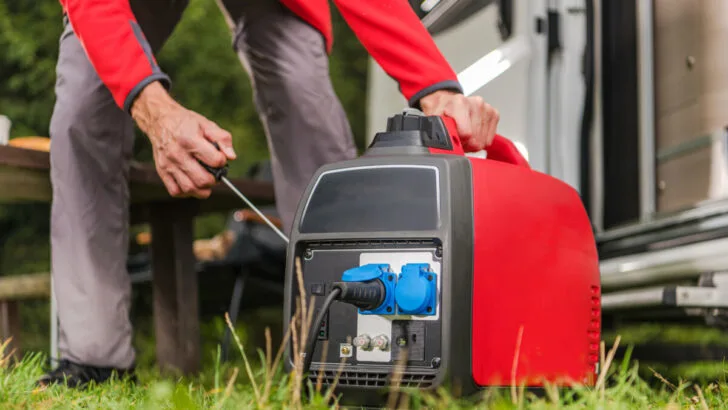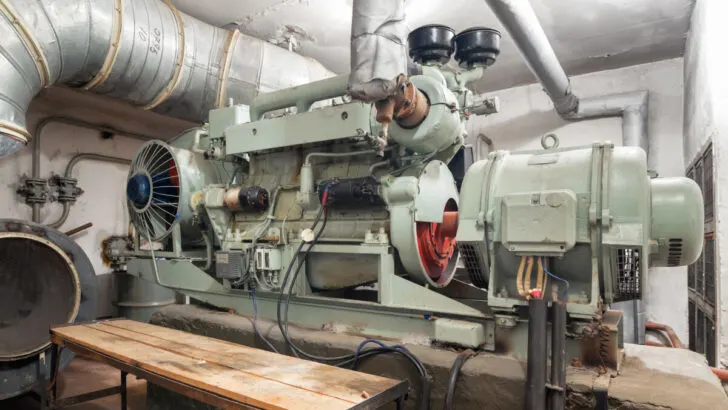Generators are a great resource to have around for camping, off-grid living, and keeping the power on during an emergency, but how long can one run?
How long a generator can run depends on its fuel source and power consumption. On average, portable gas or diesel generators can run for about 6 to 16 hours, while portable propane generators can run for 36 to 150 hours. Also, standby generators can run for 500 to 3,000 hours before needing to cool off.
The amount of time a generator can run is dependent on its model type, power delivery, and fuel source.
How Long Can a Generator Run?
In recent years, generators have become an increasingly popular thing to have around the house. Whether you want to be prepared for a natural disaster, keep the lights on during a blackout, or simply enjoy some added luxury on your next camping trip, a generator is going to ensure that you have electricity.
With that said, it’s important to understand that each generator is different. Generators are designed to create electricity from a fuel source, but there are so many ways that you can power generators these days.
The fuel source combined with the power output of the generator will determine how long it can run.
Most portable generators can run 6 to 36 hours (1.5 days) on a full load of fuel, whereas large permanent generators with a secure fuel source can run for about 500 hours (20+ days) continuously.
However, keep in mind that most generators can technically run indefinitely. So long as there is a fuel source, the generator will continue to deliver.
The issue with this is that all generators benefit from the occasional cool-off period, and in most cases require it for safety reasons.
How Long Can a Portable Generator Run?
A portable generator can be easily moved and transported, making it versatile and reliable, whether you are on the go or at home.

The most important thing to keep in mind is that portable generators can be powered by various fuel sources, which ultimately impacts how long they can run. These are the most common portable generators and their run times per fuel load:
- Gasoline/Diesel generators – 6 to 16 hours at a time
- Propane generators – 36 to 150 hours at a time
The size of the portable generator and how much power you are using will heavily influence how long it can run. If you have a secure fuel source, you can technically run a portable generator for as long as the manufacturer recommends, which usually never exceeds 16 hours for gas and diesel generators and 500 hours for propane generators.
There are other portable generator options such as solar, but due to the lack of power delivery, you can only rely on this to charge a fridge for about 5 to 7 hours at a time.
How Long Can a Standby Generator Run?
Standby generators are large, permanent units that are designed to deliver large amounts of power for prolonged periods.
A standby generator can easily power a medium-sized home, which is why many people who experience routine blackouts install one of these units on their property.
On average, you can expect a standby generator to run for at least 500 hours before it needs to be turned off for a cool-off period. These units should be able to handle upwards of 3,000 hours at a time, but manufacturers usually recommend switching them off routinely to prevent potential issues.
How to Make a Generator Run Longer?
Given that generators can potentially be a lifesaving resource, it’s important to make the most of your power while you have it.

A key way to ensure that your energy needs are being met is to make your generator run as long as possible, while naturally observing cool-off times.
While these tactics may apply more to portable generators, standby units can also benefit from energy conservation. Consider the following strategies to make your generator run longer.
Optimize Fuel Consumption
Your generator is going to consume a balanced amount of fuel if you optimize your energy needs. Each generator comes with specific power delivery recommendations so that you can run the unit without using more fuel than you need to.
Some generators allow you to manually set a power threshold, whereas others will simply display how much energy you are consuming. Regardless, you can observe how much power you are using and keep your energy consumption balanced to make your generator run longer.
Check the power recommendations for your specific generator if you want to keep your unit running as long as possible.
Switch Off When Not In Use
One of the best ways to avoid unnecessary power consumption is to simply switch off your generator when you are not using it.
This is a particularly important tactic to implement during emergencies given that you should ideally be relying on your generator for essential power needs only.
Turning off your generator periodically can result in a fraction of amount of the electricity being used. I find this is particularly useful given that you should be cooling off your generator from time to time anyways.
Secure Fuel Source
If you are running a standby generator hooked up to an unlimited supply of natural gas, you probably don’t need to worry too much about securing a fuel source.
However, if you are using a portable generator that runs on propane or gas, then you should be mindful of your energy needs and consider securing a fuel source.
The best way to do this is to be stocked with a supply of fuel, as it may not be realistic to obtain during an emergency. If you are using propane or gas, simply keep some extra fuel in a secure location on your property for a rainy day.
Key Takeaways to How Long Generators Run
How long a generator can run depends on its fuel source and power consumption.
Portable gas or diesel generators can run for about 6 to 16 hours.
Portable propane generators can run for 36 to 150 hours.


